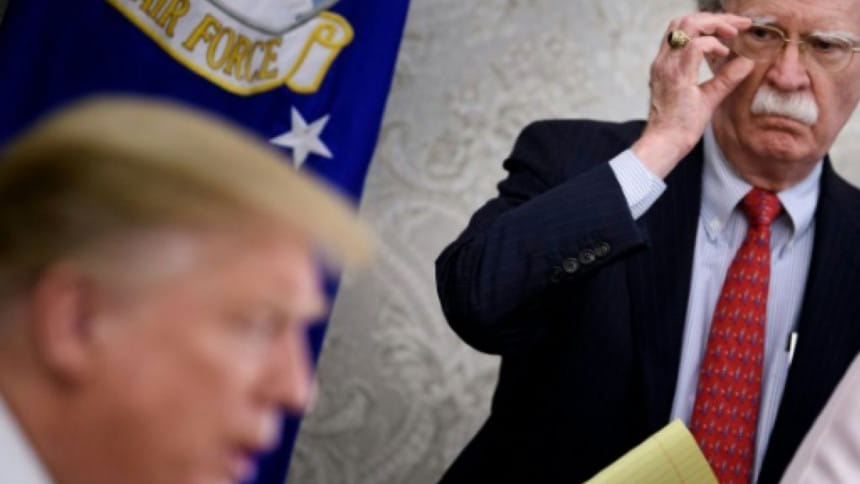Iran doesn’t seem to be bending to Trump’s threats

Since Donald Trump took charge of the White House, it did not take long for him to demonstrate that he will implement his many quixotic, disruptive and reckless ideas on a range of foreign policy and global issues. The turmoil that many of his actions (on climate change, relations with NATO allies, global trade, and so forth) have unleashed is very alarming and the consequences cannot be clearly foreseen or analysed. A year back, on May 8, 2018, his administration pulled out of the Iran nuclear deal signed in July 2015 between Iran and the P5+1 (five permanent members of the UN Security Council, and Germany). The proclaimed reason: Iran is threatening US forces in the region.
In the last few days, an explosive situation has developed in the Gulf. America has moved its aircraft carrier Abraham Lincoln, patriot missile system and B52 bombers there. The aircraft carrier has at least 40 to 50 planes on it and 6,000 forces gathered within it.
The commander of Iran's Revolutionary Guards, Major General Hossein Salami, warned that "if the Americans make a move, we will hit them in the head." He said that the US is waging a psychological war in the region. On May 12, Iranian president Hassan Rouhani exhorted Iran's political factions to unite in the face of America's tightening sanctions.
Conscious of the incendiary situation that is developing, Israel's energy minister Yuval Steinitz warned that there could be direct Iranian or proxy attacks on Israel should the US-Iranian stand-off escalate.
The recklessness of Trump's Iranian policy can be comprehended when it is considered that a lot of diplomatic rigour and toil was invested in the Iran nuclear deal. The agreement was prefaced by two years of negotiations. The core objective was to defuse mounting tension in the Middle East over the prospect of Iran acquiring nuclear weapons capability. Six nations put their due diligence into the Iranian deal. It is hard to accept that the hawkish approach of Trump's National Security Adviser John Bolton over Iran makes any sense, or that anything good can come out of the senseless brinkmanship being played out.
The concerns that three leading European nations, Britain France and Germany, feel over the Trump administration's actions has been emphatically affirmed. The statement made by the German foreign minister Heiko Mass is worth noting: "We in Europe agree that this agreement is necessary for our security. No one wants Iran to come into possession of a nuclear bomb." The not so veiled message is that American action is driving Iran towards getting the bomb that the nuclear deal sought to pre-empt.
To get a perspective on the significance of the agreement, let us briefly look at the main features. Iran agreed to eliminate its stockpile of medium-enriched uranium, slash its low enriched uranium by 98 percent, and reduce by about two thirds the number of its gas centrifuges for 13 years. For the next fifteen years, it is committed to enriching uranium up to 3.6 percent. Iran also agrees not to build any new heavy-water facilities for the same period. The IAEA will have the right to monitor Iran's all nuclear facilities. In return, Iran will get relief from all nuclear related sanctions of US, EU and UN. IAEA has stated that Iran has not violated its obligations under the agreement.
Following US withdrawal, the sanctions were re-imposed in November 2018. The purpose is to force Iran to radically alter its policies, its support for militant groups in the region, and its development of ballistic missiles. President Trump denounced and called it "the worst deal ever negotiated". The Republican party has also been critical, the main thrust being that the agreement is too conciliatory.
The divergent perceptions of threat (or otherwise) between the European nations and US was also highlighted by coalition forces Deputy Chief Major General Chris Ghika of Britain. "There's been no increased threat from Iranian-backed forces in Iraq and Syria", he told reporters.
Some Arab nations and some western countries feared that if Iran got nuclear capability, a dangerous situation would emerge. An apocalyptic horizon would open up of a nuclear war between Israel and Iran, given the inveterate enmity between the two nations. The deep mistrust between Shia Iran and Sunni Arab states like Saudi Arabia, UAE, etc. is another smouldering factor that makes the ME so dangerously unstable.
US raising the stakes on May 16th by announcing that all non-emergency government staff in Iraq will be withdrawn, coupled with the increase in military firepower, could mean that some military action cannot be ruled out. In any case, there is always a danger that some ominous miscalculation might happen, especially given the proximity of the forces and warships of the two sides.
There has also been a lot of speculation about the sabotage of four Saudi oil tankers in the Strait of Hormuz lately. The real facts behind this episode remains shrouded in mystery.
There has been high-profile media coverage of a statement made by Iran's Supreme Leader Ayatollah Al Khamenei attempting to tamp down the tension on May 15th. "This face off is not military, there is not going to be any war. Neither we nor they want any war. They know it will not be in their interest," Khamenei said. One can interpret this remark as stemming from a constructive intent in the face of provocative developments.
A very insightful report in The Guardian attributes the current war-mongering by the US on National Security Adviser John Bolton, who is misleading Trump by exploiting his ignorance of policy. Bolton once said that "to stop Iran's bomb, bomb Iran". What is perplexing is that being a critic of America's foreign wars, Trump is letting Bolton lead him over Iran. In three weeks, Trump is due for a state visit to Britain. If the current tension in the Gulf continues, it is a certainty that Trump will face raucous protests in Britain.
Ziaus Shams Chowdhury is a former ambassador.

 For all latest news, follow The Daily Star's Google News channel.
For all latest news, follow The Daily Star's Google News channel. 



Comments